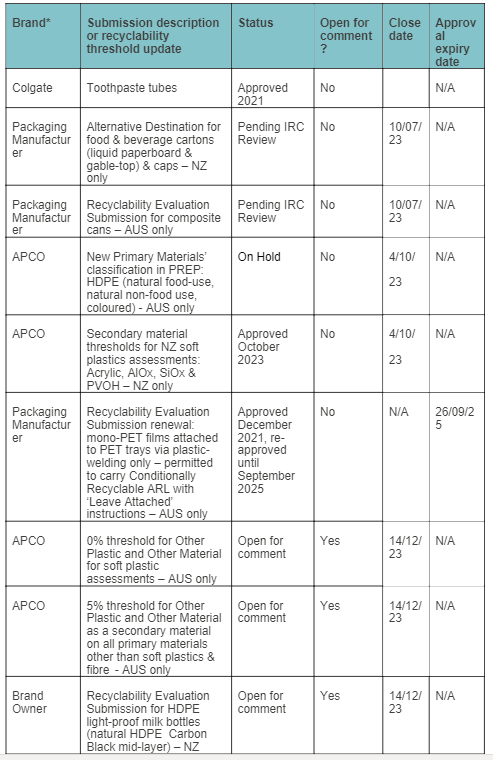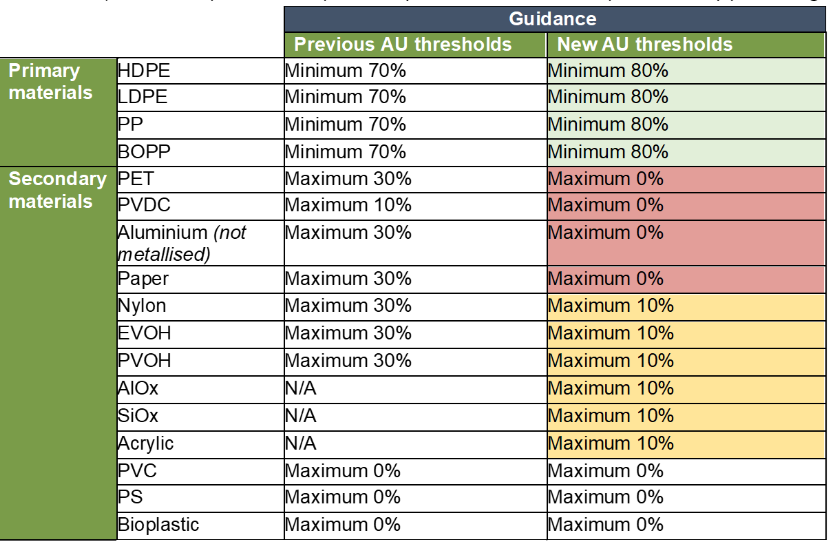The Australasian Recycling Label (ARL)
About the Program
The Australasian Recycling Label (ARL) Program is an on-pack labelling scheme that is helping consumers to recycle correctly and supporting brand owners and packaging manufacturers to design packaging that is recyclable at end-of-life.
The Program features two key elements:
- The Packaging Recyclability Evaluation Portal (PREP) - an online tool that assesses packaging recyclability in the Australian and New Zealand kerbside or approved drop-off recycling systems.
- The Australasian Recycling Label – an on-pack label that provides clear and simple instructions about how to recycle all of the separable packaging components.
The Program was developed by APCO in partnership with Planet Ark and PREP Design and includes Members such as Woolworths, Coles, Aldi, The Arnott’s Group, Australia Post, David Jones and Country Road Group, Unilever, Pact Group, Simplot, Fonterra, Goodman Fielder, Officeworks, Spotlight, Nestlé, Blackmores, The Smith’s Snackfood Company and Hanes Australasia – plus many more.
In Australia, the ARL Program has been acknowledged in the National Waste Policy Action Plan and National Plastics Plan as a key action to improve consumer awareness and increase recycling rates. As part of the National Plastics Plan, the Australian Government has committed to working with industry to see the ARL displayed on 80% of supermarket products by 2023. The New Zealand Ministry for Environment has also endorsed the ARL as the preferred labelling option in New Zealand.
ARL Program Governance
Central to the ARL Program governance structure is the committees that provide well-rounded expertise from stakeholders across the value chain to ensure decisions made are robust and evidence based, and meet the developing needs of the ARL Program. This structure has been an established part of APCO’s administration of the Program since March 2018, through various iterations as the former Marketing and Technical Advisory Committees (MAC and TAC), several material subcommittees, and the 2022 ARL Advisory Committee (AAC).
In 2023, the ARL Program underwent a governance structure review. The primary decision-maker for the Program is the Internal Review Committee (IRC), which will interact with subcommittees that cover APCO’s various topics.
Internal Review Committee (IRC)
The purpose of the Internal Review Committee (IRC) is to make decisions regarding the ARL Program ensure it is underpinned by accurate and well-informed recyclability information. These decisions are based on the recommendations of the New Zealand ARL Steering Committee (NZASC) and APCO Material Stewardship Committees (MSCs).
The New Zealand ASC is responsible for making recommendations to the IRC based on technical, market and consumer behaviour expertise specific to New Zealand.
Under the broader APCO governance structure, the ARL Team holds standing agenda items in the MSC meetings. The MSCs are the material specific subcommittees of the Collective Action Group and serve the broad technical needs of APCO, including recommendations relevant to the ARL Program such as feedback on Submissions. These committees represent the complete value chain to drive systems transformation and provide robust and considered recommendations.
Where a dispute arises, an Independent Review Panel (IRP) is convened. The IRP is managed by an external consultancy to deliver an independent and transparent process to review decisions in the ARL Program.
Submissions process in the ARL Program
The packaging and recycling industries are rapidly evolving spaces. Factors such as changing kerbside access levels and emerging technologies and infrastructure regularly influence the recyclability of packaging formats and materials in Australia. To manage these changes, the ARL Program has a clear process available to all Members. Organisations are welcome to make submissions with supporting evidence to APCO regarding various aspects of the ARL Program including:
- Where they disagree or have concerns about the recyclability results generated by PREP for a particular packaging item, or would like to demonstrate recyclability of a new or innovative material (Recyclability Evaluation Submission).
- Where they would like to propose a new consumer behaviour to be used on the Conditionally Recyclable ARL (Consumer Behaviour Submission).
- Where they would like to propose a new alternative destination for recycling to be recognised under the ARL Program (Alternative Destination Submission).
- Where they have packaging that does not meet the Australian thresholds for fibre-based packaging, or are introducing a new fibre-based material, or secondary material on fibre as a primary material but have received a positive outcome after having tested to APCO’s Standardised Test Method for Repulpability (Fibre Submission Process).
- Where they have packaging that does not meet the thresholds for soft plastics in Australia but have evidence to confirm the recyclability of their packaging following testing to an APCO-approved test methodology (Soft Plastics Submission Process).
All submission forms can be accessed through the APCO Member Centre.
Following the review, if a change is made within the ARL Program (to either or both of PREP and the ARL), this is communicated to all ARL Program Members and the wider industry.
In 2023, APCO is introducing a public comment period on all submissions and threshold changes. The table below includes currently open and historical submissions that have been approved.
If you would like to make a comment, please reach out to the ARL Team at arl@apco.org.au and we would be happy to provide further information regarding the specific submission.
ARL Program accuracy and consistency
APCO works closely with ARL Program Members to maintain consistency and accuracy of PREP evaluations and ARL artworks on the market. Processes in place to support this include:
- Auditing of ARL Program Members is conducted annually by an independent third-party auditor to assess applications of the label on the market for consistency and accuracy.
- Annual Program reporting by ARL Program Members to track the volume of labels on the market.
- Extensive training tools and resources are available to support Program Members, including online learning modules, user manuals and webinars.
Soft Plastics Label Update
We are pleased to provide you with an important update regarding the Australian Soft Plastics Thresholds and introduce new initiatives aimed at developing an effective soft plastic recycling system and restoring community confidence in soft plastic recycling labelling. This update is part of a coordinated, industry-led approach towards achieving the National Packaging Targets and improving the recyclability of soft plastics.
The QuickStart Guide to Design for Recycling: Soft Plastics Consumer Packaging outlines the thresholds for design that are live in the Packaging Recyclability Evaluation Portal (PREP) from 14th July 2023 for packaging assessed and sold in Australia.
Timeline
- Any new packaging assessed in PREP from 14th July 2023 will be assessed against these new thresholds and labelled through the ARL as informed by these thresholds. If your packaging does not meet the new thresholds, the Not Recyclable ARL must be applied.
- All packaging assessed in PREP and labelled prior to 14th July 2023 will be reassessed in PREP by the system. Organisations placing packaging on the Australian market are required to confirm the specifications entered are correct and update packaging with the accurate ARL by 1 July 2025.
Key changes
- Primary materials: the polyolefin content has increased from a min 70% to 80%;
- PET, PVDC, Paper and Aluminium (not including metallised layers) are not accepted at any % inclusion;
- Nylon, EVOH and PVOH decreased from 30% to 10% inclusion;
- AlOx, SiOx and Acrylic are considered recyclable up to 10%.
- PVC, PS and Bioplastics/compostable plastics remain unacceptable at any percentage.
More about the New Check Locally ARL logo
To enhance consumer awareness and provide accurate recycling information, we have introduced a new Check Locally ARL logo for soft plastic packaging. A new Member exclusive Style Guide is provided to support the application of the new Check Locally ARL logo. The new logo templates are available via the ARL Program page on the APCO Member Centre.
Note, the Check Locally ARL logo is also applicable to other packaging that is classified as less widely accepted where between 60-80%, in Australia and 50-80%, in New Zealand, of the kerbside population have access to a council service that collects the packaging/material. We recommend transitioning to this label at your next artwork change for all other Check Locally materials.
Labelling for New Zealand:
The thresholds for New Zealand remain unchanged. The update to the new logo is recommended at your next artwork change.
Updated ARL Website & Recycle Mate Widget:
We have made significant improvements to the ARL website and introduced the Recycle Mate Widget. The updated website now features time and place-based recovery information for drop-off, out-of-home, and kerbside services as they become available. Consumers can check locally for kerbside collections and nearby away-from-home destinations. We encourage brand owners and collectors to update the information on collection points by contacting arl@apco.org.au.
Have you got a question about an ARL you’ve seen on-pack? If you have a question or any feedback about a packaging item carrying the ARL, please raise this to the ARL Compliance Team via the ARL Complaints Form. The team will follow-up with the relevant organisation and, where a non-compliant ARL is identified, will establish an action plan for rectification.
Visit our FAQ page for more details on the ARL Program. APCO and our education partner Planet Ark have a range of resources to help get the word out about the ARL Program.
Visit our resource centre for more information. For more information on how to join or to provide feedback on the Australasian Recycling Label Program, contact the APCO team at arl@apco.org.au or phone (02) 8381 3700.

